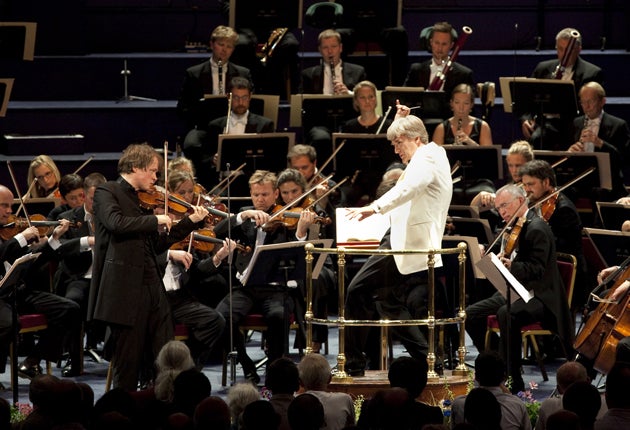BBC Proms: Danish National Symphony Orchestra / Kraggerud / Dausgaard, Royal Albert Hall, London
Welcome return for a great Dane

Your support helps us to tell the story
From reproductive rights to climate change to Big Tech, The Independent is on the ground when the story is developing. Whether it's investigating the financials of Elon Musk's pro-Trump PAC or producing our latest documentary, 'The A Word', which shines a light on the American women fighting for reproductive rights, we know how important it is to parse out the facts from the messaging.
At such a critical moment in US history, we need reporters on the ground. Your donation allows us to keep sending journalists to speak to both sides of the story.
The Independent is trusted by Americans across the entire political spectrum. And unlike many other quality news outlets, we choose not to lock Americans out of our reporting and analysis with paywalls. We believe quality journalism should be available to everyone, paid for by those who can afford it.
Your support makes all the difference.If some musical exhumations were better left underground, others rectify injustices, and thus it was with Rued Langgaard's Music of the Spheres, which has now, after a 92-year wait, had its British premiere.
Written during the First World War, this extraordinary work was for decades cast into outer darkness along with its awkward and intransigent creator. Requiring two orchestras with four sets of timpani plus eight horns, a piano, organ, soprano soloist, and choir, it deals not with themes but with timbres, note-clusters, space, and the sonic boundaries of silence. "The stars seem to twinkle kindly at us," ran the motto the composer appended to it, "yet the writing in the stars is cold and merciless." It was well received in Berlin in 1922, then fell into oblivion until the Danish composer Per Norgard rediscovered it and showed it to Gyorgy Ligeti, who promptly declared that he had been an unwitting Langgaard imitator all along.
This ingeniously constructed Prom – by the Danish National Symphony Orchestra and its associated choirs – prepared us for the Langgaard with a lovely performance of Tchaikovsky's Violin Concerto by Henning Kraggerud, and two beautifully sung a cappella works by Ligeti. And by segueing in silence from Ligeti to his late-discovered mentor, conductor Thomas Dausgaard exposed their cognate inspiration. There were long stretches of semi-inaudibility; periodically, massed timpani rent the air; but on the whole Langgaard was sparing with his effects, which came and went like clouds scudding across a clear sky. We were astonished as sounds came from remote corners of the hall: the kaleidoscope of styles was like windows opening on a succession of different sound-worlds, with echoes of Scriabine, and (when soprano Inger Dam-Jensen sang from the gods) Richard Strauss at his most lyrical.
The final movement began with a scrunching fortissimo choral chord lasting two solid minutes – with the necessary communal taking-in of breath being masked – followed by three minutes of harp-infused celestial peace. Crazy and obsessive maybe, but this was a work, and a performance, whose sheer Romantic generosity made everyone smile.
Join our commenting forum
Join thought-provoking conversations, follow other Independent readers and see their replies
Comments